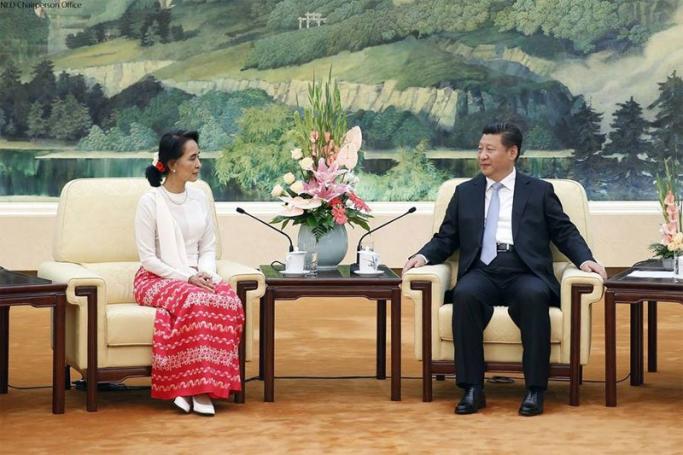Myanmar’s opposition leader Aung San Suu Kyi has met Chinese President Xi Jinping as she begins a trip that will emphasize the Nobel laureate's apparent transition from human rights defender to pragmatic politician according an article by CNN on 11 June.
Suu Kyi met Wednesday with Wang Jiarui, a senior official of the Chinese Communist Party, shortly after touching down in the Chinese capital, according to China's state-run media. Wang is vice chairman of the National Committee of the Chinese People's Political Consultative Conference and head of the International Department of the Communist Party's Central Committee.
Suu Kyi also met with Xi, and she is scheduled to meet with Premier Li Keqiang during her trip, according to her party, the National League for Democracy.
Observers say China hopes that the June 10-14 visit, a party-to-party meeting between the National League for Democracy and the Chinese Communist Party, will allow the country to boost its waning influence in its southern neighbour, which has increased engagement with the West during dramatic political reforms in recent years.
Meanwhile, Suu Kyi's first visit to China offers an opportunity to burnish her credentials as a stateswoman before national elections later this year, said Aung Zaw, editor-in-chief of The Irrawaddy, a news magazine which specializes in covering politics in Myanmar and Southeast Asia.
“She’s been dubbed a darling of the West, but she’s showing she’s someone they can work with,” he said.
Activists are calling on Suu Kyi, who was held under house arrest for nearly 15 years by Myanmar's former military junta, to speak out on human rights issues during her visit to China, which is cracking down on dissent.
In particular, Human Rights Watch's Sophie Richardson said in a statement, Suu Kyi should call for the immediate release of her fellow Nobel Peace Prize winner, the writer Liu Xiaobo, who is serving an 11-year sentence for "inciting subversion of state power" by calling for political reform and human rights.
But observers say any such move is unlikely.
“I don’t think Beijing is inviting her as an icon of democracy,” said Aung Zaw. “I think they’re seeing her as a politician who is ready to play.”
The 69-year-old leader of Myanmar's opposition National League for Democracy has been criticized since her release from house arrest in 2010 for her failure to speak up regarding causes in her country, notably the persecution of the Rohingya Muslim minority, which has created a refugee crisis in the region.
“The Aung San Suu Kyi we used to know and the one we know today are very different,” said Aung Zaw, adding that she had also disappointed some people when a commission she led had approved a controversial Chinese-operated copper mine over the objections of protesters.
“She has become a politician,” Aung Zaw said. “She’s no longer a human rights activist.”
You are viewing the old site.
Please update your bookmark to https://eng.mizzima.com.
Mizzima Weekly Magazine Issue...
14 December 2023
New UK Burma sanctions welcome...
13 December 2023
Spring Revolution Daily News f...
13 December 2023
Spring Revolution Daily News f...
12 December 2023
Spring Revolution Daily News f...
11 December 2023
Spring Revolution Daily News f...
08 December 2023
Spring Revolution Daily News f...
07 December 2023
Diaspora journalists increasin...
07 December 2023












